Direct & Indirect Speech | English Grammar for Class 6 PDF Download
| Table of contents |

|
| Introduction |

|
| Direct Speech |

|
| Indirect Speech |

|
| Rules for Changing Direct Speech to Indirect Speech |

|
Introduction
The word "speech" refers to anything we say or write. When you want to share what someone else has said or written, you can do it in two different ways:
- Repeating Exactly: You can repeat the exact words that the person used. This is called Direct Speech.
- Explaining in Your Own Words: You can tell the meaning of what the person said using your own words. This is called Indirect Speech.
Direct Speech
In Direct Speech, we repeat the exact words that the person used. These exact words are put inside inverted commas (” “), and this part of the sentence is called the Reported Speech. The verb that introduces the reported speech is called the Reporting Verb.
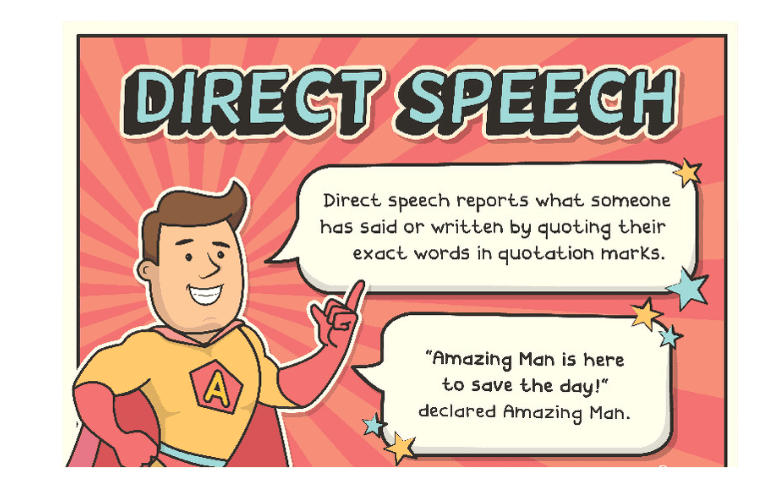
Example: Aman said, “I am ill today.”
- Here, “I am ill today” is the Reported Speech and it is placed within inverted commas.
- "Said" is the Reporting Verb.
- The first word inside the inverted commas starts with a capital letter.
Indirect Speech
In Indirect Speech, we tell the meaning of what the person said, but we don’t use their exact words. Instead of repeating the words exactly, we explain what the person meant without using inverted commas.
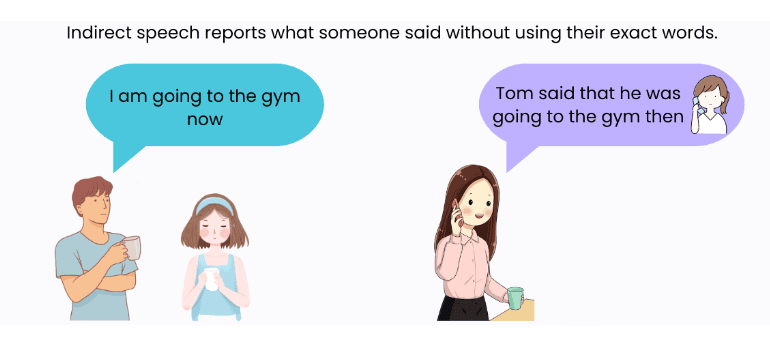
Example: Aman said that he was ill that day.
- Here, we do not use inverted commas.
- The word "that" is used to introduce the reported speech.
- The comma after the reporting verb ("said,") is removed.
- The tense of the reporting verb ("said") stays the same, even though the rest of the sentence may change tense.
Rules for Changing Direct Speech to Indirect Speech
1. Rules for the Change of Tense
Rule I: If the Reporting Verb is in the Present or Future Tense, the Tense of the Verb in the Reported Speech does not change.
Examples
- Direct: Rajesh says, “She has brought fame to her family.”
Indirect: Rajesh says that she has brought fame to her family. - Direct: Rohit has said, “I cannot displease my friend.”
Indirect: Rohit has said that he cannot displease his friend. - Direct: I shall say, “I went to Agra on Monday.”
Indirect: I shall say that I went to Agra on Monday. - Direct: She will say, “I have sent him a present.”
Indirect: She will say that she has sent him a present.
Rule II: If the Reporting Verb is in the Past Tense, the tense of the verb in the Reported Speech must be changed into the corresponding Past Tense.
Examples
- Direct: I said, “I am speaking the truth.”
Indirect: I said that I was speaking the truth. - Direct: The teacher said, “Boys fail because they do not study regularly.”
Indirect: The teacher said that boys failed because they did not study regularly.
Exception to Rule II
(i) If there is a Universal Truth or Habitual fact in the Reported Speech, the Tense of the verb is never changed ; as—
- Direct : He said, “Face is the index of mind.” (Proverbial truth)
Indirect: He said that face is the index of mind. - Direct: The teacher said, “The earth rotates round its axis.” (Geographical truth)
Indirect: The teacher said that the earth rotates round its axis. - Direct: Horatius said, “Death comes sooner or later.” (Universal truth)
Indirect: Horatius said that death comes sooner or later.
(ii) The Tense of the Verb in the Reported Speech does not change if the reported speech states a past historical fact; as—
- Direct: He said, “India became free on 15th August 1947.”
Indirect: He said that India became free on 15th August 1947. - Direct: She said, “Her father lived in Lahore for ten years.”
Indirect: She said that her father lived in Lahore for ten years.
(iii) If two such actions are given in the Reported Speech which takes place at the same time, the Past Indefinite or Continuous Tense does not change.
- Direct: He said, “Mohan was singing a song while Gopal was playing on a flute.”
Indirect: He said that Mohan was singing a song while Gopal was playing on a flute. - Direct: She said, “I am a top-class singer.”
Indirect: She said that she was a top-class singer. - Direct: We said, “He is writing a poem.”
Indirect: We said that he was writing a poem. - Direct: He said, “It may rain tonight.”
Indirect: He said that it might rain that night. - Direct: He said, “A devil ever remains a devil.”
Indirect: He said that a devil ever remains a devil.
The future tense of the reported speech Is changed as under :
Future Indefinite—would / should
Future Continuous—would/should be
Future Perfect—would/should have
Future Perfect Continuous—would/should have been
Examples
- Direct: You said, “He is a very good athlete.”
Indirect: You said that he was a very good athlete. - Direct: I said, “I have finished my work.”
Indirect: I said that I had finished my work. - Direct: He said, “Her parents will pay a visit to Delhi.”
Indirect: He said that her parents would pay a visit to Delhi.
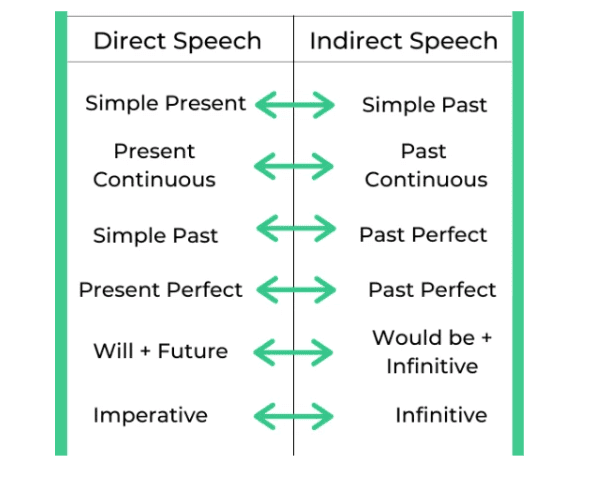
2. Change of Pronouns
Rule:
- First Person Pronouns (I, we) change according to the subject of the reporting verb.
- Second Person Pronouns (you) change according to the object of the reporting verb.
- Third Person Pronouns (he, she, it, they) remain unchanged.
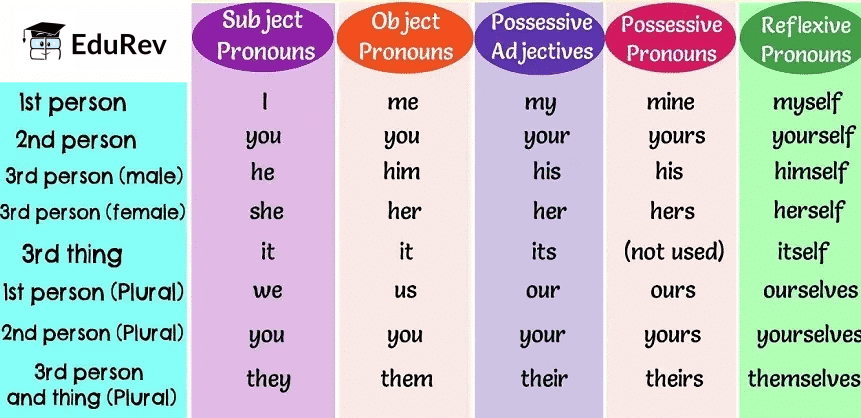
Examples:
- Direct: He said to me, "You have done your duty."
Indirect: He told me that I had done my duty. - Direct: I said to him/Ram,"You have done your duty."
Indirect: I told him/Ram that he had done his duty. - Direct: I said, "He has done his duty."
Indirect: I said that he had done his duty. - Direct: You said to me, "She had done her duty."
Indirect: You told me that she had done her duty.
3. Change of Words Denoting Time and Position
Rule: Words that indicate time and place are changed to match the shift from direct to indirect speech.
- Here becomes there
- Now becomes then
- Today becomes that day
- Tomorrow becomes the next day or the following day
- Yesterday becomes the previous day or the day before
- Ago becomes before
- This becomes that
- Last becomes the previous
- Next becomes the following
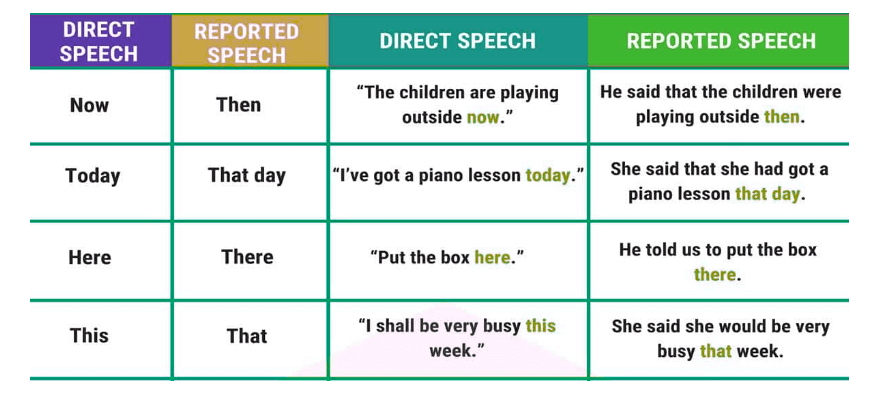
Examples:
- Direct: Bhim said to me, "I shall go to Delhi tomorrow."
Indirect: Bhim told me that he would go to Delhi the next day. - Direct: Raju said, "I went to the zoo yesterday."
Indirect: Raju said that he had gone to the zoo the previous day. - Direct: He said, "I met an accident here two days ago."
Indirect: He said that he had met an accident there two days before. - Direct: She said to him, "I shall see you tomorrow."
Indirect: She told him that she would see him the next day. - Direct: Hans said, "I bought these clothes yesterday."
Indirect: Hans said that he had bought those clothes the previous day. - Direct: Laxmi said, "I shall do it now."
Indirect: Laxmi said that she would do it then.
Conversion Of Interrogative Sentences
From Direct to Indirect: Rules
1. The Reporting Verb is changed, into ‘ask. enquire, inquire or demand’
2. No conjunction is used to introduce the Reported Speech if the question begins with (an interrogative) word ; such as—what, who, whose, which, when, where, why, how. whom etc.
3. If or whether is used to introduce the Reported Speech if the reported speech has no question word.
4. Change the questions into statements. Put Jail stop in place of mark of interrogation (?).
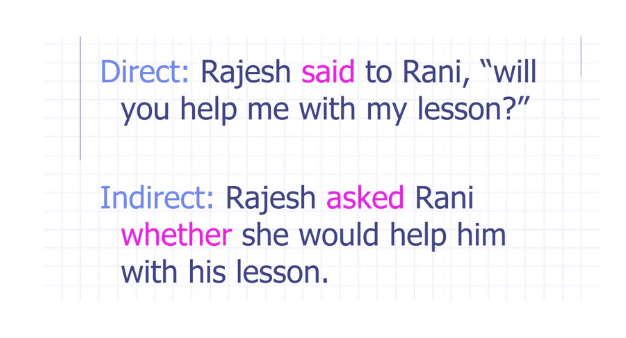
Examples
(a) Questions beginning with a Helping Verb
- Direct: He said to her, “Shall I accompany you to Agra ?”
Indirect: He asked her if he would (should) accompany her to Agra. - Direct: She said to him, “Had I been absent from school for a month ?”
Indirect: She asked him if she had been absent from school for a month. - Direct: He said to us, “Has she been spinning since yesterday ?”
Indirect: He asked us if she had been spinning since the previous day. - Direct: They said to you, “Shall we be going on a picnic tomorrow ?”
Indirect: They asked you if they would be going on a picnic the next day. - Direct: I said to her, “Will you have ironed your clothes ?”
Indirect: I asked her if she would have ironed her clothes.
(b) Sentences having ‘Yes’ or ‘No’
- Direct: “Are there any more files ?” He asked. “Yes, sir,” said the peon.
Indirect: He asked the peon if there were any more files. The peon replied respectfully in affirmative. - Direct: The teacher said to Lila, “Did you break the window pane ?” “No, sir,” said Lila, “I did not.”
Indirect: The teacher asked Lila if she had broken the window pane. Lila replied respectfully and refused it (to have done it). - Direct: “If you find my answers satisfactory, will you give me five rupees ?” said the astrologer. “No, ’ replied the customer.
Indirect: The astrologer asked the customer whether he would give him five rupees if he found his answers satisfactory. The customer replied in negative. - Direct: I said to him, “Do you want to go to Chandigarh ?” He said, “No, sir.”
Indirect: I asked him if he wanted to go to Chandigarh and respectfully he replied in negative. - Direct: He said to me, “Does Mohan still play ?” I. said, “Yes, sir.”
Indirect: He asked me if Mohan still played and I replied in positive.
(c) Questions beginning with Interrogative Words
- Direct: He said to me, “Whom does she want to contact ?”
Indirect: He asked me whom she wanted to contact. - Direct: They said to her, “Whose house are you purchasing ?”
Indirect: They asked her whose house she was purchasing. - Direct: You said to him “Why are you making mischief ?”
Indirect: You asked him why he was making mischief. - Direct: They said to us, “How have you solved this sum ?”
Indirect: They asked us how we had solved that sum. - Direct: We said to them, “Who has misguided you ?”
Indirect: We asked them who had misguided them.
(d) Questions beginning with modal auxiliaries
- Direct: I said to him, “May Sunita come in to discuss with you something ?”
Indirect: I asked him if Sunita might come in to discuss with him something. - Direct: The traveller said to me, “Can you tell me the way to the nearest inn?
Indirect: The traveller asked me if I could tell him the way to the nearest inn. - Direct: He said to me, “Must I leave for Mumbai tomorrow ?”
Indirect: He asked me if he had to leave for Mumbai the next day. - Direct: I said to her, “Could you give me your notes ?”
Indirect: I asked her if she could give me her notes. - Direct: I said to him, “Need I go to him ?”
Indirect: I asked him if I had to go to him.
|
49 videos|349 docs|46 tests
|
FAQs on Direct & Indirect Speech - English Grammar for Class 6
| 1. What is direct speech? |  |
| 2. What is indirect speech? |  |
| 3. What are the rules for changing direct speech to indirect speech? |  |
| 4. Can you provide an example of changing direct speech to indirect speech? |  |
| 5. Why is it important to understand direct and indirect speech? |  |





















